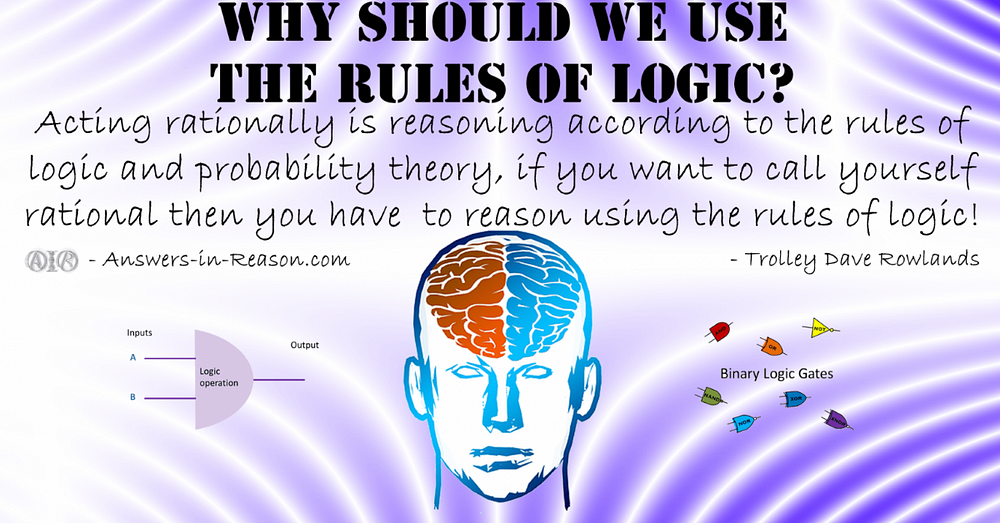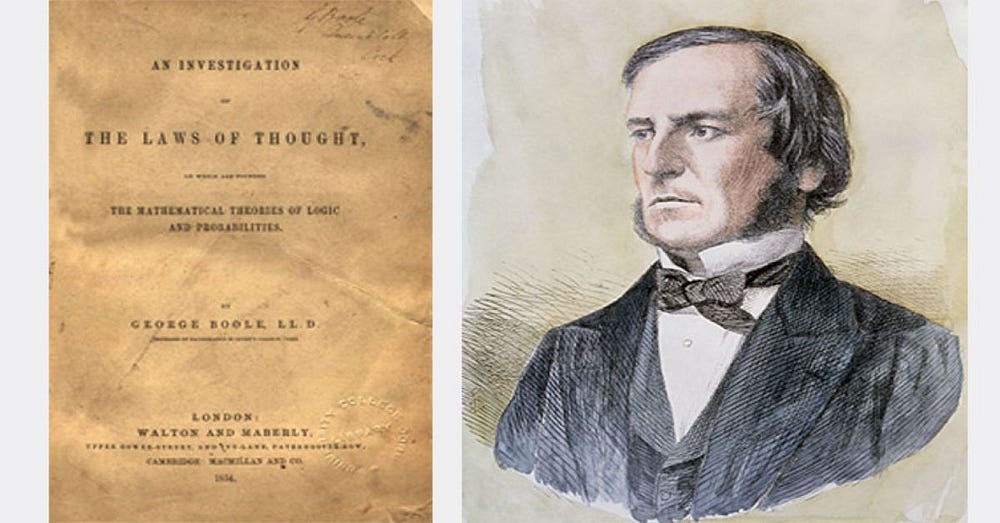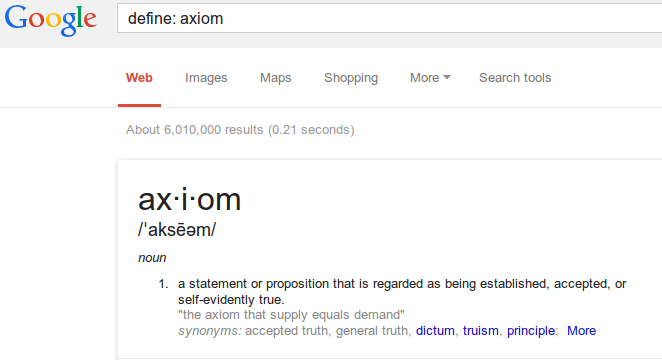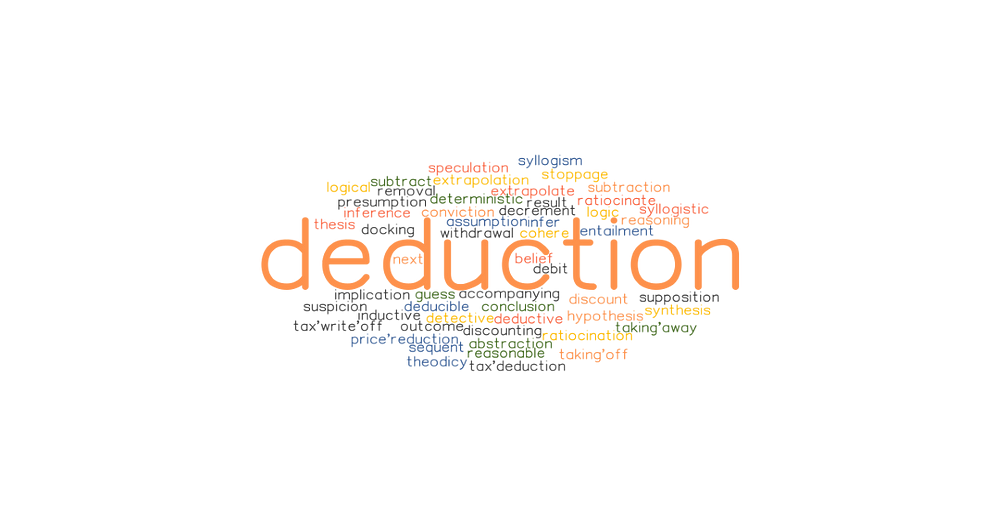How do we know that any given deductive inference is correct or valid?
***********************
The terms “laws” and (less so) “rules” are immediately problematic within the context of logic. After all, logical laws or rules aren’t really like judicial or religious laws. And they aren’t like the rules found in everyday life. Yet, despite that, it’s hard to think of suitable alternative terms. Indeed any alternatives will probably be more problematic, not less so. So that’s why most philosophers and logicians have stuck with the terms “laws” and “rules”.
In addition, the logical laws or rules were once believed to be a consequence of what were deemed to be the laws of thought. And, interestingly enough, that move from the laws of thought to the rules of logic must itself have been — at least partly — logical in nature.
(The actual words “laws of thought” were made popular by the mathematician and logician George Boole in the mid 19th century. This notion was then largely rejected in the early-to-mid 20th century. See later section.)
As it is, this essay won’t deal with these general issues. It will, instead, simply deal with deduction (or deductive inferences) from a largely philosophical (i.e., not purely logical or technical) point of view.
The Rules of Deduction

How do we know that any given deductive inference is correct or valid? (See logical validity.)
Apparently, it’s simple. It’s correct or valid if it abides by a general rule of deductive inference.
This means that if the deductive inference does abide by such a general rule, then it’s believed to be correct or valid. In fact it’s believed to be correct or valid even if the end result of the deduction (i.e., the conclusion) is outrightly false. (Such as: “Swans are fish.”)
Conversely, if the general argument doesn’t abide by the rules of deductive inference, then it’s believed to be invalid or incorrect — even if the end result of the deduction (or the conclusion) is outrightly true. (Such as: “Swans are birds.”)
But where do these laws or rules of deductive inference come from?
What makes them correct or valid themselves?
What makes such things laws or rules in the first place?
And why do we accept these laws or rules and not others?
Perhaps the rules (the word “rules”, rather than “laws”, will be used from now on) of deductive inference depend on other things.
If that is so, then what other things do they depend upon? Do they depend on other rules of deductive inference or simply just on… other things?
Note that the very use of the word “rules” seems to imply (at least to some extent) that deductive rules needn’t — at least not necessarily — depend on anything else. That’s because, in broad terms, logical rules can be deemed to be normative and/or prescriptive in nature — and are therefore (basically) stipulations. (That would still be the case even if the logical rules were based on the laws of thought!) That said, does it follow that because logical rules are normative and/or prescriptive in nature that they needn’t depend on prior (logical?) factors?
It can be concluded, then, that either deductive — and other — logical rules are to some extent arbitrary or that they depend on prior factors. Perhaps both.
So would a rule that’s truly arbitrary be acceptable — or even useful — in logic? Alternatively, if these rules of deductive inference themselves depend on prior (logical?) factors, then what do those prior factors depend on — yet more prior factors? Indeed doesn’t this show us that there’s a clear regress on our hands? And, in turn, doesn’t that regress show us the need to create logical rules in the first place?
In addition to the question of rules, it can be said that an inference (or even a general argument) can be justified by the fact that it abides by the general rules of deductive inference. Yet isn’t justification an epistemological (i.e., not a logical) term? (An epistemological justification usually depends on such things as observation, evidence, memory, testimony, and whatnot — along with logical reasoning.) That said, surely the word “justification” is often used in ways which aren’t — strictly speaking — epistemological.
So in what way is the word “justified” being used here?
Perhaps the argument is justified simply because it abides by the rules of deductive inference. In other words, the fact that it abides by these rules means that it’s justified. And, in turn, it’s justified because it abides by these logical rules.
(Note: The psychological effort — or mental state — required to see whether a deduction or argument abides by logical rules will itself depend on the reasoner’s experiences, memory, knowledge, etc. Of course that would be a point about the reasoner’s psychology, not a point about the logical rules themselves or about the justification of a deduction. In other words, the deduction would stand regardless of a particular reasoner’s — or any reasoner’s — psychological history or character.)
Where Do Logical Laws Come From?

The justification of the rules of deductive inference were mentioned a moment ago. There are various ways in which logical rules (or logical laws) can be justified.
Traditionally, logical rules have been justified by showing that they follow from self-evident axioms. (See also axioms.) These axioms were (or still are) seen to be true simply by virtue of thinking about — and also understanding — them. That is, one needn’t (as it were) go elsewhere to justify such axioms. Indeed it’s even been said — many times — that (only certain?) axioms “justify themselves”.
Of course we need to know how this is possible and be given an example of such a self-evident axiom. We’d also need to know how the the rules of deductive inference follow from such axioms. In other words, just as we need to know (for example) how the premises in an argument (when taken together) lead to a particular conclusion, so we also need to know how the laws of deduction follow from such self-evident axioms — or even from axioms which aren’t self-evident.

One possibility is that these laws or rules of deductive inference are (as it’s often been put in philosophical history) “grounded in the human mind itself”. That is, we can’t help but use them. Either that, or we can’t help but see that they’re correct (or right) when used in particular arguments. This may therefore mean that all rational persons will use the same logical rules or inferences. However, this doesn’t also mean that all reasoners know that they’re using such logical rules. And it certainly doesn’t mean that they can (or could) express (or formulate) them in a technical or symbolic language. Nonetheless, reasoners still follow such rules of deductive inference regardless of their knowledge of formal and informal logic.
The Interplay Between Deductive Inferences and Logical Rules

It was just stated that most reasoners (i.e., not logicians) simply know when they’ve gone wrong in a logical argument.
One way in which both logicians and non-logicians know they’ve used an invalid (or incorrect) rule is when it yields an unacceptable inference or conclusion. That is, if the inference takes you to a conclusion which simply can’t be accepted (either for purely logical reasons or for reasons of truth), then that rule will be rejected.
So what we have here — at least in part — is an interplay between deductive inferences and general rules. That is:
i) Valid deductive inferences are justified by their conformity to general rules.
ii) General rules are justified by their conformity to valid deductive inferences.
Yet aren’t i) and ii) above viciously circular?
That is, isn’t it circular to argue that general rules justify valid deductive inferences and valid deductive inferences justify general rules?

The American philosopher Stephen Stich (1943 — ) argues (in his paper ‘The Problem of Cognitive Diversity’) against the viciousness of this logical circle by putting the following two points:
i) A general rule is “amended” if it yields an inference (or conclusion) we are unwilling to accept.
ii) An inference is rejected if it violates a rule we are unwilling to amend.
Both i) and ii) seem psychological in nature. That is, the phrases “unwilling to accept” and “unwilling to amend” are surely psychological (i.e., not logical). This means that — on the surface at least — we aren’t supplied with a logical reason as to why we should amend a general rule (i.e., we’re simply told that it leads to “an inference we are unwilling to accept”). Similarly, we aren’t given a logical reason as to why we should reject a given inference (i.e., even if it does “violate a rule”). However, that may be because we can never really go beyond the interplay — or virtuous circle — between general rules and valid inferences. We can only reject or amend a general rule if it yields an unacceptable inference (or conclusion). And we can on reject an inference if it violates a rule we’re unwilling to amend.
Now all that is indeed logical… at least up to a point.
In these cases, then, logical rules are (as it were) keeping an eye on deductive inferences. Similarly, the deductive inferences are keeping an eye on the logical rules. Yet the psychological nature of our “unwillingness to amend” a rule or our “unwillingness to accept” an inference is set within a logical context. Despite that, logic itself still can’t make that decision for us. (How could it?) The reasoner will still need to decide if an inference violates a rule or if a rule needs to be amended because it yields an inference (or conclusion) he’s unwilling to accept. However, the decision itself will be psychological in nature.
Again, that psychological decision will (or should) be based on the logic of the situation. Yet logic on its own can’t make that decision. That said, logic does (as it were) “tell” the reasoner what’s gone wrong, either in terms of an unacceptable inference or a rule he’s unwilling to amend. Yet it’s up to the reasoner to act on that clash between logical rules and deductive inferences.










No comments:
Post a Comment